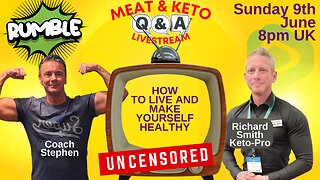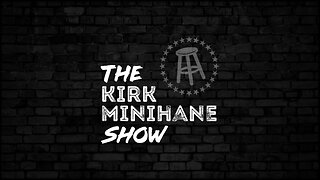Meat & Keto Q&A: How the WHO and CDC hide data
Coach Stephen and Richard Smith answer questions live and discuss the hiding of data regarding the trail that compared saturated fat and vegetable oil. The results will shock you. The cover-up will astound you.
FAT CLUB (talked about in the video)
To be part of Fat Club (open to those not already part of our mighty network, click here https://keto-low-carb-carnivore-co.mn.co/plans/342710?bundle_token=57770c1dc42478b11feaf567fd9a00b7&utm_source=manual
Highlights: Discussing blood pressure during a low carb, ketogenic, carnivore lifestyle and the importance of sodium intake.
ROUGH TIMESTAMPS
00:07 Starting a low carb diet can cause a drop in blood pressure due to insulin sensitivity.
- When insulin levels drop, the kidneys release sodium, leading to a decrease in blood pressure.
- Increasing sodium intake can help combat the temporary drop in blood pressure caused by a low carb diet.
- Society's fear of sodium is misplaced, as it is essential for life and consuming an adequate amount is important.
02:37 Higher sodium intake increases risk of death, with a sweet spot of 4 to 6,000 milligrams per day.
- Low carb ketogenic diets can cause blood pressure to drop, but in some people, it can increase.
- This is due to the body's response to decreased sodium caused by insulin's release.
- The body releases angiotensinogen and renin, which convert into angiotensin I and II.
- Angiotensin II binds to AT1 receptors, causing constriction and decreasing bradykinin, essential for nitric oxide production.
- Constriction leads to negative feedback, releasing aldosterone, which retains sodium.
07:09 Consuming oxidized omega-6 in animal-based meats can increase blood pressure.
- Meats can be injected with antibiotics and have different feeding methods.
- It is difficult to navigate through the various meat qualities.
- Choose meat over highly toxic foods like grains and seed oil.
- Butcher-added ingredients can affect the quality of meat.
- Find a reliable butcher and be mindful of food choices to avoid high blood pressure.
09:35 Blood pressure varies with age and circumstances, so age-related charts can be misleading.
- Blood pressure increases as you age due to the stiffening of artery walls, even if you're otherwise healthy.
- Blood pressure measurements can be affected by various factors and can vary greatly in different individuals.
- Age-related blood pressure charts can give a general idea but may not accurately reflect an individual's health status.
- Knowledge about blood pressure mechanisms is essential, but practical considerations should also be taken into account.
14:07 Chewing bones and consuming cartilage provides essential minerals
- Eating bones and cartilage provides collagen, which is high in minerals.
- Modern society lacks the minerals found in bones and cartilage.
- Adding salt to meals is generally beneficial for mineral intake.
16:35 Following a ketogenic carnivore lifestyle can improve arterial flexibility and combat oxidative damage.
- Including salt in meals can help alleviate tiredness and provide essential minerals for energy production.
- While some individuals may not need to use additional salt if their diet already contains sufficient levels of sodium and potassium.
20:42 Politics, lobbying money, and vested interests have ruined the credibility of certain studies.
- The study on the effects of salt on blood pressure is based on genetically modified mice.
- The recommended salt intake guidelines by the American Heart Association are based on this flawed study.
22:50 Lower LDL levels are associated with a higher risk of death
- A study with over 68,000 participants found an inverse association between high LDL levels and all-cause mortality
- The results showed that 92% of the participants had a higher risk of death with lower LDL levels
26:51 Cholesterol is not detrimental to our health, it heals and repairs the body
- Belief in the system was based on a lie and ego of someone
- Eating cereal instead of bacon and eggs was promoted
- Cardiovascular disease used to be lower when people ate bacon and eggs
- There are different types of LDL, with pattern A being good and pattern B being bad
- LDL cholesterol travels through the body to heal and repair, then gets recycled by the liver
28:54 LDL particles with damaged receptors can lead to the formation of atherosclerotic plaques.
- LDL particles with damaged receptors cannot be transported back to the liver.
- These particles accumulate in the bloodstream and try to perform their function.
- They travel to damaged arterial walls and release lipids for healing.
- Macrophages recognize the damaged receptors and allow the entry of oxidized and glycated LDL particles.
- This leads to the formation of foam cells, which are the starting point of atherosclerotic plaques.
- Consuming foods that cause glycation and oxidation can damage LDL particles.
32:47 To determine if LDL is oxidized and glycated, check triglycerides, HDL, and triglyceride to HDL ratio.
- Triglycerides should be less than 0.5 mini moles per liter.
- HDL should be above 1.5.
- Triglyceride to HDL ratio should be less than one.
34:42 Diet plays a crucial role in various health conditions, including schizophrenia, Alzheimer's, dementia, and ADHD.
- Medication primarily treats symptoms rather than addressing the root cause.
- Saturated fats are essential and beneficial for a healthy diet.
- Research supports the health benefits of saturated fats and cholesterol.
- A study showed that saturated fats are healthier than vegetable and olive oil.
38:30 The brain needs glucose but can potentially survive without it.
- Red blood cells and the brain need glucose, but the brain may prefer BHB.
- The body can produce glucose through a process called gluconeogenesis.
- We do not need to consume any dietary carbohydrates.
- People on the ketogenic lifestyle not only survive but thrive.
40:28 Liquid Stevia is considered safe and one of the best artificial sweeteners.
- Using artificial sweeteners over sugar can confer benefits.
- Stevia is a natural sweetener and does not contain carbs like other sweeteners.
- The electrolyte drink mentioned contains a small amount of Stevia.
44:15 Using liquid Stevia in products has not shown any negative effects on testosterone or sperm count.
- No downstream effects have been noticed when using Stevia with stevia for years.
- The amount of Stevia in products is very low and not a concern for infertility issues.
46:06 Vegetable oil in small amounts is not harmful compared to other dietary factors.
- Vegetable oil is used in minimal quantities by most companies and is often the last ingredient on the list.
- The potential harm caused by small amounts of vegetable oil is negligible.
- If consuming vegetable oil in small amounts allows you to maintain your dietary journey, it is not a major concern.
- Compared to other harmful dietary factors, such as fast food or unhealthy meals, the impact of small amounts of vegetable oil is minimal.
- Even strict carnivores have cheat days or off days, showing that occasional small amounts of vegetable oil are not considered harmful.
49:48 Moderation is key when it comes to consuming coffee and Stevia.
- Coffee contains toxins like acrylamide and caffeine, which can cause various health issues including inflammation and cancer.
- However, if consumed in moderation, the body can cope with these toxins and excrete them without noticeable effects.
- Similarly, Stevia is a small part in the bigger picture of coffee consumption and does not cause significant concern.
51:43 Consuming coffee with Stevia is sustainable and promotes consistency.
- Stevia is a sweet alternative to artificial sweeteners.
- Artificial sweeteners may contain fillers to compensate for low quantities.
- Some companies deliberately create a delay in results to seem more thorough.
- Consumers should be aware of added ingredients in sweeteners.
55:52 Eating grains was a common practice in ancient civilizations.
- Dr. Chaffy's claim that grain-based diets cause AOS sclerosis is not supported by evidence.
- Mummies from 4,000 years ago consumed grains as part of their diet.
- The Egyptians relied on staple crops, including cereals, in their diet.
- The Inuits, who suffered from AOS sclerosis, used open fires indoors, which could have contributed to their condition.
57:56 The debate about smoking and consumption of cereals and legumes
- The individuals mentioned in the conversation were heavy smokers, even from a young age.
- Lithuania was a society that consumed cereals and legumes in the 14th century.
- Dr. Nagar edited something to show a benefit, while Dr. Chaffy responded with his own answer.
- The live streams are not edited, and what is said during the streams is left as is on YouTube.
- The credibility of someone who edits videos and manipulates content goes down.
-
 29:15
29:15
the UK carnivore
1 day ago $0.53 earnedKeto Pro and Coach Stephen
4113 -
 LIVE
LIVE
The Kirk Minihane Show
3 hours agoKMS Live - June 10, 2024
428 watching -
 2:25:41
2:25:41
Matt Kohrs
16 hours agoThe Meme Squeeze Saga, Live Options Trading & Breaking News || The MK Show
11.1K2 -
 1:39:13
1:39:13
The Podcast of the Lotus Eaters
6 hours agoThe Podcast of the Lotus Eaters #933
23.3K12 -
 2:02:37
2:02:37
AP4Liberty
3 hours agoDemocrats Abandoning Progressivism
12.3K2 -
 8:29
8:29
Front & Center with Jacquie Jordan
3 days agoBreaking The World's Speed Record and Mystery Patriot - Trump boat revealed
17.1K10 -
 7:36
7:36
scoutthedoggie
1 day agoBloody Airsoft War Scotland
28.4K3 -
 10:23
10:23
Freakin' Reviews
1 day agoArctic Air Ice Jet vs Pure Chill: Ultimate Cooling Showdown!
28.2K5 -
 11:23
11:23
ryanhoguepassiveincome
18 hours agoTOP 5 NICHES 🔥 Print on Demand Niche Research # 211 — (6/9/2024)
33.6K3 -
 23:57
23:57
Cody and Kellie
17 hours agoWe Destroyed Our Home, Can We Repair It?
32.2K10